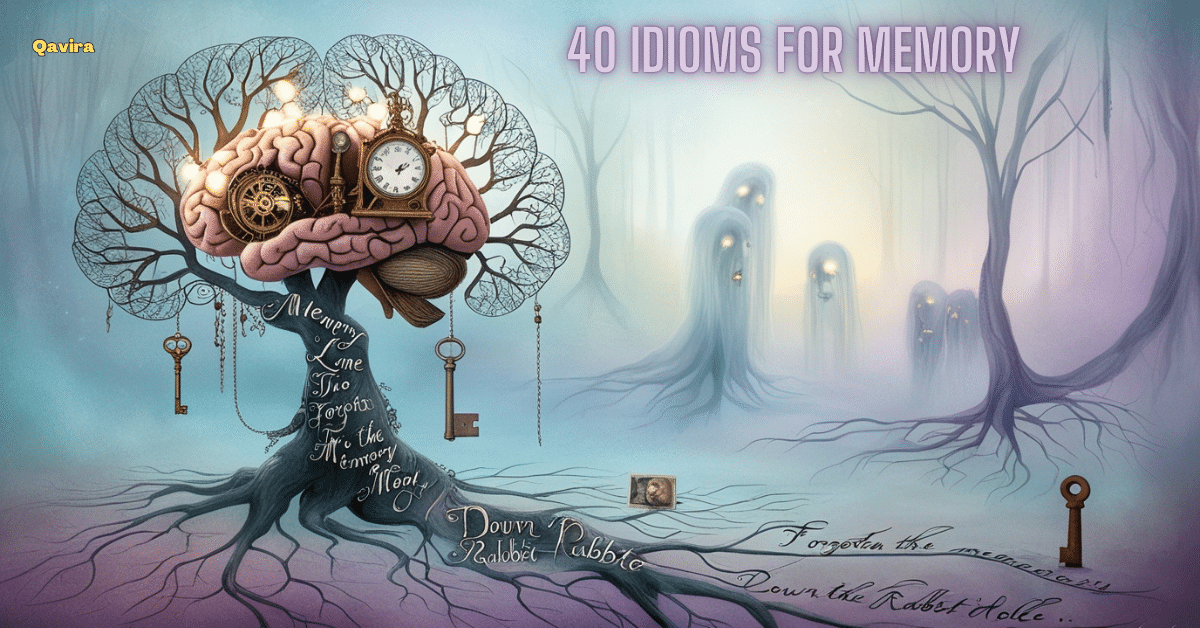Memory is a fascinating aspect of human cognition, influencing how we recall experiences and information. Idioms related to memory often encapsulate our feelings about remembering, forgetting, and the passage of time.
These idioms serve as cultural touchstones, reflecting our shared understanding of how memory shapes our lives. They can provide insight into our thoughts and emotions regarding the past and our ability to retain knowledge.
Idioms for Memory
1. A Memory Like a Sieve
- Meaning: Refers to someone who forgets things easily.
- In a Sentence: “I have a memory like a sieve; I can never remember where I put my keys.”
- Other Ways to Say: Forgetful, absent-minded, scatterbrained.
2. To Jog Someone’s Memory
- Meaning: To help someone remember something.
- In a Sentence: “I showed her old photos to jog her memory about our trip.”
- Other Ways to Say: Refresh someone’s memory, remind, prompt recollection.
3. Out of Sight, Out of Mind
- Meaning: If something is not present, it is forgotten.
- In a Sentence: “After moving away, I realized that out of sight, out of mind really applies to friendships.”
- Other Ways to Say: Forgotten, neglected, overlooked.
4. A Trip Down Memory Lane
- Meaning: A nostalgic recollection of the past.
- In a Sentence: “Looking at old yearbooks took us on a trip down memory lane.”
- Other Ways to Say: Reminiscing, nostalgia, reflecting on the past.
5. Memory Lane
- Meaning: A metaphorical path of memories from the past.
- In a Sentence: “Every time I see that park, it sends me down memory lane.”
- Other Ways to Say: Recollection, reminiscence, past experiences.
6. A Blast from the Past
- Meaning: Something that brings back memories from the past.
- In a Sentence: “Hearing that old song was a blast from the past.”
- Other Ways to Say: Nostalgic reminder, throwback, old times.
7. Remember the Good Times
- Meaning: Focus on positive memories rather than negative ones.
- In a Sentence: “Even after the breakup, I choose to remember the good times we shared.”
- Other Ways to Say: Cherish happy moments, focus on positives, recall the joy.
8. To Bury the Hatchet
- Meaning: To make peace and forget past grievances.
- In a Sentence: “After years of fighting, they finally decided to bury the hatchet.”
- Other Ways to Say: Make amends, reconcile, patch things up.
9. A Slip of the Tongue
- Meaning: An unintentional mistake in speech.
- In a Sentence: “When I called her by the wrong name, it was just a slip of the tongue.”
- Other Ways to Say: Misstatement, verbal mistake, faux pas.
10. To Go Down in History
- Meaning: To be remembered for something significant.
- In a Sentence: “His achievements in science will go down in history.”
- Other Ways to Say: Be remembered, leave a legacy, become iconic.
11. To Have a Memory Like an Elephant
- Meaning: Refers to someone with an excellent memory.
- In a Sentence: “She has a memory like an elephant; she remembers everyone’s birthdays.”
- Other Ways to Say: Sharp memory, recall easily, good at remembering.
12. To Draw a Blank
- Meaning: To be unable to remember something.
- In a Sentence: “During the quiz, I drew a blank on the last question.”
- Other Ways to Say: Forget, have a lapse, fail to recall.
13. Keep It in Mind
- Meaning: To remember something for future consideration.
- In a Sentence: “Keep it in mind that the deadline is next week.”
- Other Ways to Say: Remember, note, take into account.
14. To Have One’s Head in the Clouds
- Meaning: To be forgetful or not paying attention.
- In a Sentence: “He often has his head in the clouds during meetings.”
- Other Ways to Say: Distracted, daydreaming, not focused.
15. The Memory of a Goldfish
- Meaning: Refers to someone with a very poor memory.
- In a Sentence: “My brother has the memory of a goldfish; he forgets what I just told him.”
- Other Ways to Say: Forgetful, absent-minded, short memory.
16. To Put on the Back Burner
- Meaning: To set aside something for later.
- In a Sentence: “I had to put my plans for travel on the back burner.”
- Other Ways to Say: Delay, postpone, defer.
17. In the Blink of an Eye
- Meaning: Something that happens very quickly.
- In a Sentence: “The opportunity vanished in the blink of an eye.”
- Other Ways to Say: Instantly, in a flash, suddenly.
18. To Live in the Past
- Meaning: To focus too much on former times rather than the present.
- In a Sentence: “He lives in the past and often reminisces about his glory days.”
- Other Ways to Say: Nostalgic, dwelling on memories, stuck in old ways.
19. To Have a Mind Like a Steel Trap
- Meaning: To have a very sharp and quick memory.
- In a Sentence: “She has a mind like a steel trap; she remembers every detail.”
- Other Ways to Say: Quick-witted, sharp-minded, astute.
20. To Forget Like It’s Nothing
- Meaning: To forget something easily and without concern.
- In a Sentence: “He forgets like it’s nothing; he can’t remember our last conversation.”
- Other Ways to Say: Easily forget, brush off, disregard.
21. To Keep the Memory Alive
- Meaning: To remember and honor someone or something.
- In a Sentence: “They hold an annual event to keep the memory alive of their founder.”
- Other Ways to Say: Commemorate, remember, honor.
22. A Walk Down Memory Lane
- Meaning: Reflecting on past experiences.
- In a Sentence: “Looking through old photos is always a walk down memory lane.”
- Other Ways to Say: Reminiscing, reflecting, nostalgia trip.
23. To Clear One’s Mind
- Meaning: To remove distracting thoughts or memories.
- In a Sentence: “I meditated to clear my mind before the exam.”
- Other Ways to Say: Focus, refresh thoughts, declutter mentally.
24. A Memory to Cherish
- Meaning: A special memory worth holding onto.
- In a Sentence: “The wedding was a memory to cherish for a lifetime.”
- Other Ways to Say: Treasured moment, valued recollection, beloved memory.
25. To Let It Slip Your Mind
- Meaning: To forget something temporarily.
- In a Sentence: “I meant to call her, but it slipped my mind.”
- Other Ways to Say: Overlook, forget momentarily, lose track.
26. A Shadow of a Memory
- Meaning: A faint or vague recollection of something.
- In a Sentence: “I have only a shadow of a memory from that childhood event.”
- Other Ways to Say: Faint recollection, hazy memory, vague remembrance.
27. To Go Back in Time
- Meaning: To recall events from the past.
- In a Sentence: “Listening to that song makes me feel like I can go back in time.”
- Other Ways to Say: Reminisce, reflect on the past, travel back in memory.
28. To Have a Foggy Memory
- Meaning: To have unclear or confused recollections.
- In a Sentence: “I have a foggy memory of what happened during the meeting.”
- Other Ways to Say: Unclear recall, hazy memories, indistinct remembrance.
29. To Keep a Tight Rein on Memories
- Meaning: To control or manage one’s memories carefully.
- In a Sentence: “She keeps a tight rein on her memories, only sharing the good ones.”
- Other Ways to Say: Manage carefully, control recollections, preserve selectively.
30. To Be Haunted by Memories
- Meaning: To be troubled or distressed by past events.
- In a Sentence: “He was haunted by memories of the accident.”
- Other Ways to Say: Troubled by the past, burdened by recollections, affected by memories.
31. To Recall with Clarity
- Meaning: To remember something distinctly and clearly.
- In a Sentence: “I can recall with clarity the day we met.”
- Other Ways to Say: Clear memory, vivid recollection, precise remembrance.
32. To Take a Trip Down Memory Lane
- Meaning: To nostalgically remember past experiences.
- In a Sentence: “Going through my old journals took me on a trip down memory lane.”
- Other Ways to Say: Reminisce, look back fondly, reflect on the past.
33. To Have a Memory That Lasts a Lifetime
- Meaning: To create a memorable experience that one will never forget.
- In a Sentence: “That vacation was a memory that lasts a lifetime.”
- Other Ways to Say: Unforgettable experience, lifelong recollection, cherished moment.
34. To Put It in the Back of Your Mind
- Meaning: To remember something but not focus on it right now.
- In a Sentence: “I’ll put it in the back of my mind until I’m ready to deal with it.”
- Other Ways to Say: Set aside mentally, defer consideration, remember later.
35. A Faded Memory
- Meaning: A recollection that is no longer clear or vivid.
- In a Sentence: “The details of that day have become a faded memory.”
- Other Ways to Say: Blurred recollection, distant memory, unclear past.
36. To Have Selective Memory
- Meaning: To remember only certain things while forgetting others.
- In a Sentence: “He seems to have selective memory about our arguments.”
- Other Ways to Say: Choose what to remember, biased recall, remember only the good.
37. To Hold onto Memories
- Meaning: To cherish and retain memories.
- In a Sentence: “I like to hold onto memories of my childhood.”
- Other Ways to Say: Treasure, keep close, preserve.
38. To Be a Walking Memory
- Meaning: Someone who remembers everything well.
- In a Sentence: “My grandmother is a walking memory; she knows all our family history.”
- Other Ways to Say: Living archive, human encyclopedia, memory keeper.
39. To Have a Clear Picture in Your Mind
- Meaning: To remember something vividly.
- In a Sentence: “I have a clear picture in my mind of that beautiful sunset.”
- Other Ways to Say: Vivid memory, distinct recollection, sharp imagery.
40. To Forget the Past
- Meaning: To move on from previous experiences or memories.
- In a Sentence: “It’s time to forget the past and focus on the future.”
- Other Ways to Say: Move on, let go, release past memories.
Quiz on Idioms for Memory
1. What does “to have a memory like an elephant” mean?
a) Excellent memory
b) Poor memory
c) Forgetful
Answer: a) Excellent memory
2. What does it mean to “draw a blank”?
a) To remember everything
b) To be unable to remember
c) To recall something vividly
Answer: b) To be unable to remember
3. What does “keep it in mind” imply?
a) Forget something
b) Remember for future consideration
c) Ignore the information
Answer: b) Remember for future consideration
4. What does “to have one’s head in the clouds” mean?
a) To be very focused
b) To be distracted or forgetful
c) To have a clear mind
Answer: b) To be distracted or forgetful
5. What does “the memory of a goldfish” refer to?
a) A very good memory
b) A very poor memory
c) An average memory
Answer: b) A very poor memory
6. What does “to put on the back burner” mean?
a) To prioritize something
b) To set aside for later
c) To remember something
Answer: b) To set aside for later
7. What does “in the blink of an eye” signify?
a) Something that takes a long time
b) Something that happens very quickly
c) Something that is easily forgotten
Answer: b) Something that happens very quickly
8. What does “to live in the past” imply?
a) To focus on the present
b) To dwell too much on former times
c) To forget past experiences
Answer: b) To dwell too much on former times
9. What does “to have a mind like a steel trap” mean?
a) To have a poor memory
b) To have a very sharp memory
c) To forget easily
Answer: b) To have a very sharp memory
10. What does “to forget like it’s nothing” mean?
a) To remember everything
b) To forget easily and without concern
c) To have a selective memory
Answer: b) To forget easily and without concern
11. What does “to keep the memory alive” mean?
a) To forget about someone
b) To honor and remember someone or something
c) To ignore the past
Answer: b) To honor and remember someone or something
12. What does “a shadow of a memory” refer to?
a) A very clear recollection
b) A faint or vague recollection
c) A recent memory
Answer: b) A faint or vague recollection
13. What does “to have a foggy memory” imply?
a) Clear recall
b) Unclear or confused recollections
c) Strong memory
Answer: b) Unclear or confused recollections
14. What does “to recall with clarity” mean?
a) To remember something distinctly
b) To forget details
c) To have a vague memory
Answer: a) To remember something distinctly
15. What does “to have selective memory” mean?
a) To remember everything
b) To remember only certain things while forgetting others
c) To have a flawless recall
Answer: b) To remember only certain things while forgetting others
Conclusion
Idioms for memory encapsulate our complex relationship with recalling the past. They highlight how memories shape our identities, influence our emotions, and serve as cultural markers. By using these idioms, we can express the nuances of memory, from nostalgia to forgetfulness, enriching our conversations and understanding of human experiences.

Carla Jones is an expert blogger in English Language Teaching, sharing innovative strategies and insights to empower educators and enhance language learning experiences for students worldwide.








